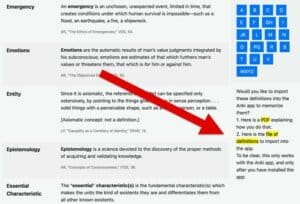When I was a graduate student studying Objectivism, my professor, Harry Binswanger, required that I memorize all of the definitions that are mentioned in Objectivism: The Philosophy of Ayn Rand. One or more of them appeared on every exam. Thanks to this assignment, I created a set of handwritten flash cards, and I used them to memorize the definitions and test myself on them as I rode the subway to and from work.
My box of flash cards was my initial contribution to The Glossary of Objectivist Definitions (available both in book form and on a free website here.) My partner for that project, Allison Kunze, contributed a comprehensive list of all definitions that appeared in Ayn Rand’s writing. I am pleased to announce that there is now a way to import all of the terms from the glossary into the Anki app, so you can memorize them using 21st century digital technology. Scroll down on the website to the definitions to see the instructions for how to do this or go straight there with this link.
All definitions are not created equal
I am not suggesting that you memorize every definition in the dictionary. Dr. Binswanger recommended that we memorize Ayn Rand and Leonard Peikoff’s definitions because they concerned fundamental concepts that are needed to make crucial philosophic distinctions. You need to know these key concepts to cut through the conceptual confusion and imprecision that is the hallmark of communication in the post-modern world.
I am aware that this is a controversial point of view, and I am not going to try to convince you of it per se. But as part of announcing this resource, I thought I’d take a shot at concretizing the value I see in memorizing key definitions, and perhaps inspire a few people to take advantage of it.
Other definitions might be worth memorizing — such as key terms in your field of specialty. Medical school still requires that doctors memorize a tremendous amount of vocabulary, and that gives them a scaffolding of knowledge on which they can hang practical knowledge about diagnosis and treatment. If you are a professional in any field, you need to know the definitions of key terms. Having that knowledge at your fingertips makes the difference in how easily you can integrate and apply other knowledge.
And I’ll just mention that if anyone is deeply interested in essentialization — which translates to a love of precision, concretization, and definition — there is an in-depth self-study course in the Thinking Lab on this critical topic.
How I benefitted from memorizing definitions
Learning Objectivist definitions was critical to my intellectual development. When you learn definitions of fundamental terms, you give yourself a means to keep fundamental distinctions in mind. That makes it easier to think on your feet about related issues.
For example, the first definition I memorized happened to be “anti-concept,” which was on a list Dr. Binswanger gave in a lecture on “How to Study Ayn Rand’s Writings.”
An anti-concept is an unnecessary and rationally unusable term designed to replace and obliterate some legitimate concept.
–AR, “Credibility and Polarization,” ARL, Oct. 11, 1971, 1.
In the same lecture he had said we should look at neologisms with a fishy eye, because they could be anti-concepts.
At the time, I was a graduate student at Carnegie Mellon, reading academic articles in psychology. Many researchers use novel terms to try to capture their findings. I was amazed at how many of these new terms specifically denied or replaced concepts pertaining to consciousness. “Frame” would be used instead of “assumptions” or “context.” “Verbal reports” instead of “introspective observations.” The term “productions” blurred the difference between a computer process producing a result and a mental process resulting in knowledge.
I would never have noticed these issues if I didn’t have the precise wording of the definition of “anti-concept” in mind. When I spotted a neologism, the question, “Is this trying to replace and obliterate some legitimate concept?” would pop up spontaneously. This in turn would raise the question, “What legitimate concept might be being replaced?” Since academic psychology is still essentially behaviorist, I usually found that what was replaced was a concept pertaining to consciousness.
As another example, three other definitions helped me rethink Marshall Rosenberg’s idea of “universal needs” and come up with my list of “deep rational values.”
“Need” in this context denotes that which is required for survival.
–LP, “‘Life’ as the Essential Root of ‘Value,’” OPAR, 210.
“Value” is that which one acts to gain and/or keep.
–AR, “The Objectivist Ethics,” VOS, 16, 27. LP discusses in “‘Life’ as the Essential Root of ‘Value,’” OPAR, 208.
Ethics is the branch of philosophy that . . . provides “a code of values to guide man’s choice and actions— the choices and actions that determine the purpose and the course of his life.”
–LP, Introduction to “The Good,” OPAR, 206, quoting AR, “The Objectivist Ethics,” VOS, 13.
Rosenberg’s use of the term “need” set off a warning bell. His list included things like “air” and “shelter” (clearly needs), but it also included concepts related to the virtues of independence, integrity, honesty, and justice. Plus it included quite a few social values, including a couple that I don’t recognize as needs or even values, such as “interdependence” and “reassurance.” I saw immediately that they come from a different moral code.
I doubt I would have zeroed in on Rosenberg’s idea and rethought it in terms of deep values — specifically deep rational values — if I hadn’t memorized those definitions. It wouldn’t be enough to learn the precise distinctions concerning needs and values. I also need to be able to recall them easily — which is what memorizing these definitions accomplished for me.
Before you memorize any definition
If this inspires you to start memorizing some definitions, I strongly recommend that you first validate any definition for yourself. This is a critical step, which I learned from Dr. Binswanger.
The definition of a concept consists of two parts: the genus and the differentia. The genus is the wider group that includes the referents of the concept and of its nearest relatives, i.e., the concepts whose referents are most fundamentally similar. The differentia names in fundamental terms what makes this concept different from those other concepts.
You need to concretize both the genus and the differentia to see if you agree that this makes sense.
For example, when we you hear ethics is “a code of values,” ask yourself, “What would this code of values be?” Ayn Rand’s ethics has the “supreme and ruling values” of reason, purpose, and self-esteem. Christianity’s are faith, hope, and charity. Those are two different ethical systems, each with a code of values. This concretization might be enough for you to validate that definition.
I did this validation process whenever I made a new flash card. If you use the digital tool we’ve provided, I suggest you validate the definition whenever a new term comes up. Spend as much or as little time as you need to be convinced that this definition is true, clear, and precise. If it’s not true, clear, and precise, you shouldn’t memorize it!
This goes for any definition you find anywhere. Validate it for yourself before accepting it, using it, and committing it to memory. This is worth doing in your field of specialization if you want to accelerate your learning.
During and after memorizing any definition
As you may know from grade school and acting classes, memorization requires a lot of repetition. But not just any repetition. As Percy Buck says in Psychology for Musicians (a classic), “Practice doesn’t make perfect; perfect practice makes perfect.”
When you work on memorizing a definition, don’t settle for an approximate understanding. Get all of the words precisely, in the right order.
Then, afterwards, when a question arises that pops part or all of the definition into your head, don’t apply it blindly. Think about whether there is a distinction to make here that would be helpful. Sometimes there will be. Sometimes there won’t.
I will close with the end of our preface from The Glossary of Objectivist Definitions:
Ayn Rand was the first to grasp the objective nature of concepts, and therefore of the psycho-epistemological need for definitions. As she said,
The purpose of a definition is to distinguish a concept from all other concepts and thus to keep its units differentiated from all other existents. . . . It enables man, not only to identify and retain a concept, but also to establish the relationships, the hierarchy, the integration of all his concepts and thus the integration of his knowledge. (AR, ITOE, 40.)
She grasped this seminal truth and left behind a magnificent legacy of precise, illuminating definitions. Use them for what they are: signposts pointing to reality.










0 Comments